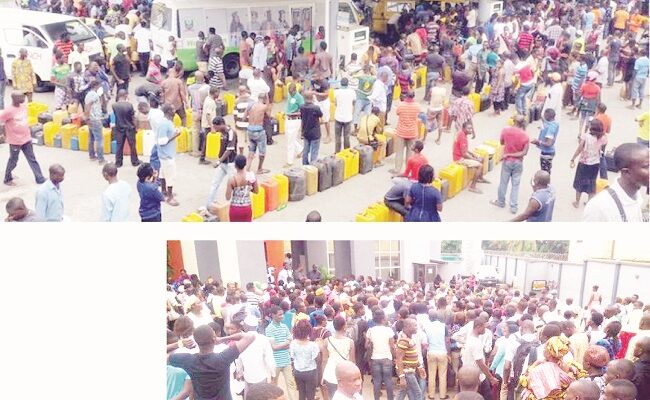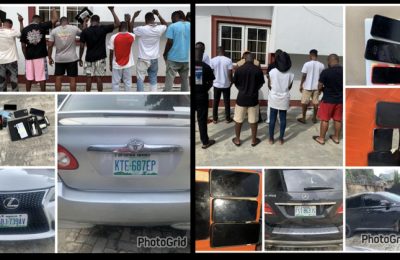YINKA OLUKOYA, PAUL OMOROGBE, JUSTICE NWAFOR and YOMI AYELESO, in this piece, report the disruption of livelihoods following the indiscriminate price hike of premium motor spirit (otherwise known as petrol) and the unavailability of the newly introduced naira notes.
At the Farin Dada market on Bauchi Road in Jos, Plateau State, 56-year-old Abubakar Musa stands with his legs crossed, looking over his bags of cucumbers placed nearby. Abubakar scans the inlet roads quickly, looking for anyone who might appear to be carrying some cash. With the expectation of making quick sales, Abubakar arrived at the market around 8 am. However, by 2 pm, only one bag out of the eight bags he brought had been sold, which is unheard of for him.

In the Hausa language, he said to the Nigerian Tribune on Monday that “For a long time, I have never had sales this bad. Before now, people would come to pay for the cucumber and within two hours I would finish for the day. But now they all complain that there is no cash.”
They don’t lack funds; rather, they are unable to withdraw cash from the bank, according to Abubakar. “Even when I reduced the price, nobody was willing to buy”, he added.
Abubakar is just one of the many buyers and sellers in the bustling market who have struggled with a lack of cash and declining sales. The low sales, the Nigerian Tribune found, has had a steep crunch on their businesses as many buyers now prefer to stay away from the market.
According to numerous sources at the market, fewer people are visiting the market as a result of the lack of cash, and at the same time, sales and profit have dropped significantly. This is especially problematic for vendors like Abubakar whose products are perishable and have a short shelf life. Other market vendors told the Nigerian Tribune that because of low sales, they would have to discard many of their products and incur losses.
For example, baskets of tomatoes were packed in the market’s tomato section, which was unusual just two weeks ago.
“I rely on this business to feed my family and anything that affects this business affects not just me but the lives and wellbeing of my children and wives”, Abubakar said.
The current economic climate is not ideal for business owners, entrepreneurs, and the majority of Nigerians nationwide, just like it is for Abubakar and other vendors at the Farin Dada market: it’s difficult to get cash, sales have decreased, and the fuel shortage has made things worse.
How did this start?
On Wednesday, October 26, 2022, Godwin Emefiele, the governor of the Central Bank of Nigeria (CBN), announced the apex bank’s intention to redesign and issue new N200, N500, and N1,000 notes.
According to the governor, President Muhammadu Buhari had given his blessing to the development. Therefore, before the deadline of January 31, 2023, Nigerians who possess cash in any of these denominations must return it to their banks.
He added that the new currency will go into circulation starting on Thursday, December 15, 2022, and listed additional justifications for the change, such as Nigerians’ hoarding of notes, the rising risk of counterfeiting, and the lack of clean and suitable banknotes.
The circulation date was reached; there were barely any new notes in sight, and the old notes held sway. As the deadline of January 31 drew near, chaos ensued at bank automated teller machines (ATMs) as customers rushed to obtain the new cash. Two days before the deadline, the apex bank extended the deadline by 10 days and assured that there were enough notes to serve Nigerians. But the situation appears to contradict the apex bank’s assurances. Long queues persist, and point-of-sale (POS) operators now charge up to 20 per cent of any withdrawn amounts. Initially, only the new notes were hard to come by, but reports indicate that even the older notes are now in short supply.
While this bites, fuel scarcity across the country has made the situation even worse. While Nigerians are not new to long queues at fuel stations, especially during festive seasons, the spillover into January and now February seems to be a height. In some parts of the country, a liter goes for as much as N450 in petrol stations, while on the streets, a liter goes for as much as N500.
The economic difficulties of many Nigerians have been made worse by this double whammy. With inflation still hovering over 20 per cent and the unemployment rate above 30 per cent, the impacts of this crisis cut really deep. For Nigerians in far-flung communities and those who do not have access to banking services, this situation is even worse as there would be little or no means of obtaining the new notes.
“Aunty B,” as she is popularly called in her neighborhood, is a mature single woman living in Ibadan, the capital of Oyo State. She was at a shop not far from her house on Monday morning to grab some snacks – ‘egg roll’ and drink – before she set out for the day.
Before she pays, she asks the lady selling the snacks if Timileyin, the POS operator in the neighbourhood, has showed up that morning. Auntie B asks so that she does not have to go through the unprecedented and unusual process of paying for snacks via a bank transfer, as she did when she came to buy snacks previously over the weekend. The response to her question is negative. Timileyin has not been available for the past four days. Timileyin is yet to be able to secure cash for his business from the bank.
Automated teller machines of various banks were found empty while the few that had cash in them were besieged by customers.
Nigerian Tribune made the observation after visiting a number of bank branches in highly commercial areas of Ibadan including Mokola, Dugbe, Queens Cinema, and Oke Ado.
Reports from the Molete and Challenge areas of the city indicated that ATMs at these locations were also mostly empty.
Customers were observed to be wary of collecting old notes from ATMs while others simply wanted money to withdraw.
How businesses have been affected
In Ibadan, POS terminal operators have had to increase charges for cash withdrawals. A withdrawal of N5,000 that would ordinarily attract a charge of N100 now attracts a fee of at least N300, and up to N700 in some locations.
In fact, many POS terminal operators have resorted to rationing the amount a single customer can withdraw. The limit is N2,000 for a number of POS terminal operators.
‘My wife could only withdraw N1,000 across a bank’s counter’
Bola Yohanna, a POS operator in the Molete area of Ibadan, explains his ordeal in getting cash to run his business. “For up to four days, I have not been able to do business. When you enter the bank, the bank will give you N1,000 across the counter. If you want more than that, they direct you to the ATM. When you get to the ATM, the maximum you can withdraw is N20,000. And you have to queue.
“Today, my wife was in the ATM queue from around 12 noon. Around 5 pm, they were told the money in the ATM had run out! As we speak, there is no money for our business. She was only able to withdraw N1,000 from across the counter!”
In another area of Ibadan, Akobo precisely, a saleswoman who simply gave her name as Titilayo said that the naira scarcity had badly affected sales in her supermarket.
“People cannot withdraw their own money, and it has affected sales.”
‘We are charged N1,500 for N10,000 by POS operators’
Apart from poor sales, she added that “the POS people here charge N700 for a N5,000 withdrawal. If you want N10,000, the charge on it is N1,500!”
She said the situation cannot be sustained for long.
“People are really suffering,” she added. “Three people came to my supermarket asking for money. One of them said he needed just N1,000 to buy food because he could not get money from three POS operators he had visited!
“He was begging and prostrating and was ready to give me N200 as charges! He wouldn’t have eaten this morning if I hadn’t given it to him.”
In Ogun, some commuters traveling outside the state capital have started hitchhiking to their destinations. Transport fare from Abeokuta to Sagamu increased from N800 to N1000 since the scarcity of fuel started, ditto, to other intercity fares.
A leading noodles manufacturing company, on the first day in the month of February, increased all prices of its products with immediate effect.
Food prices keep increasing on a daily basis as the scarcity of Premium Motor Spirit (PMS) bites harder. There is low patronage of food items, due to lack of funds.
Many residents spend hours at various ATM points to access money which is not available, while many queue endlessly to buy petrol where it is available.
A trader at Kuto Market, Mrs Afusat Oseojuolohun, lamented low patronage of goods by consumers. She told the Nigerian Tribune that five litres of palm oil that she sold at N5,500 last week has jumped to N6,500 on Monday, this week.
While another trader in the pepper business, Modupe Ariyo, said prices of tomatoes, onions, chili pepper and the rest of them increased from N3,000 to N4000 from Ogere market to Abeokuta.
Mrs. Funmi Esuruoso, a provision seller also at Kuto market, lamented the high cost of goods on a daily basis.
“The people controlling the affairs of this nation are not treating us well. We are suffering in the midst of plenty. For over a month now, things are not the same in our business. No thanks to fuel scarcity and the introduction of new naira notes. I can’t comprehend why we are passing through these difficult situations. I buy a litre of petrol at N350 into my car to be able to take my children to school and my shop. I know how much I have expended on buying petrol.
“You people should help us beg those in authority. We are getting tired of these negative happenings around us,” she added.
In Ekiti State, the hike in fuel and scarcity, including the difficulties in accessing the new N200, N500 and N1,000 naira notes have subjected more residents to hardship.
Nigerian Tribune observed from the few stations visited that a litre is sold between N300 and N500, a development which has caused untold hardship on residents across the state.
The scarcity of the naira notes has made it possible for PoS operators to get involved in brisk business by charging exorbitant prices for those patronising them for the naira notes.
The fuel scarcity has also resulted in hike in transportation fares across the state, which motorists allude to the hardship faced in getting the product at higher prices.
Investigations showed that Ado to Awo-Ekiti, formerly N300, has been increased to N500; Ado to Oye-Ekiti is now N800 from the initial N300.
In a visit to the major markets, prices of food items have also been affected due to the fuel and naira notes scarcity.
Students of the Ekiti State University, Ado-Ekiti, staged a protest in front of the university gate on Wednesday due to the increase in transportation fares to the campus. The students in their large number barricaded the road leading to the institution causing a gridlock.
The students’ union president, Dotun Ogunsanya disclosed that the students would not allow the increase of the shuttle bus transport fare from N200 to N400. He called on the drivers and the school management to liaise together in reducing the fare to the initial price in the interest of the struggling students.







